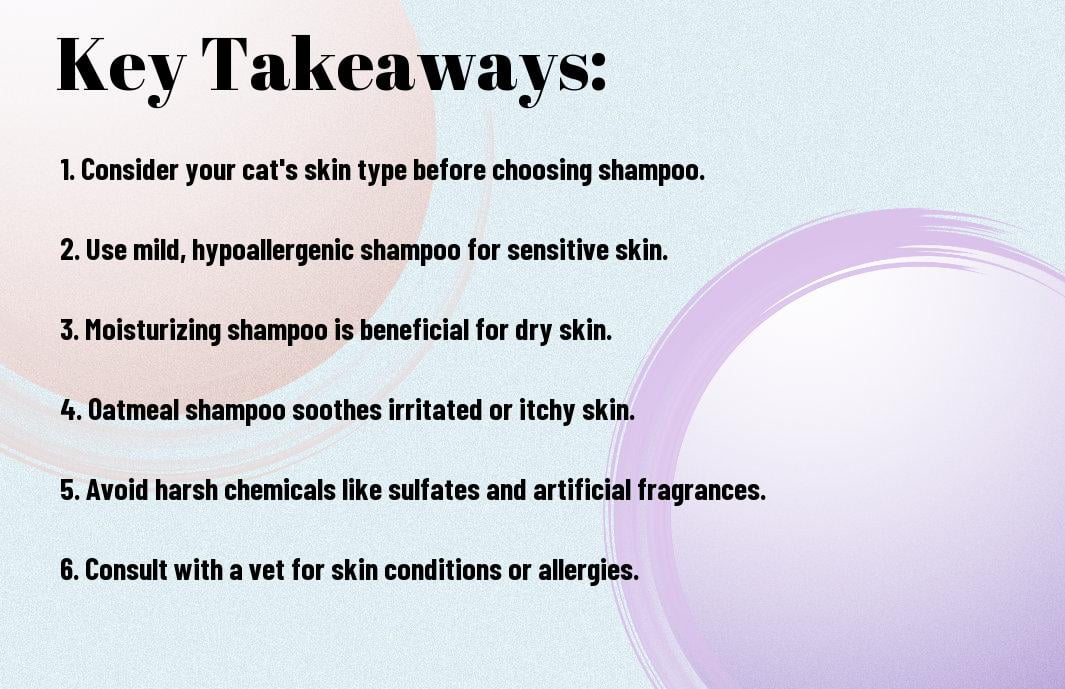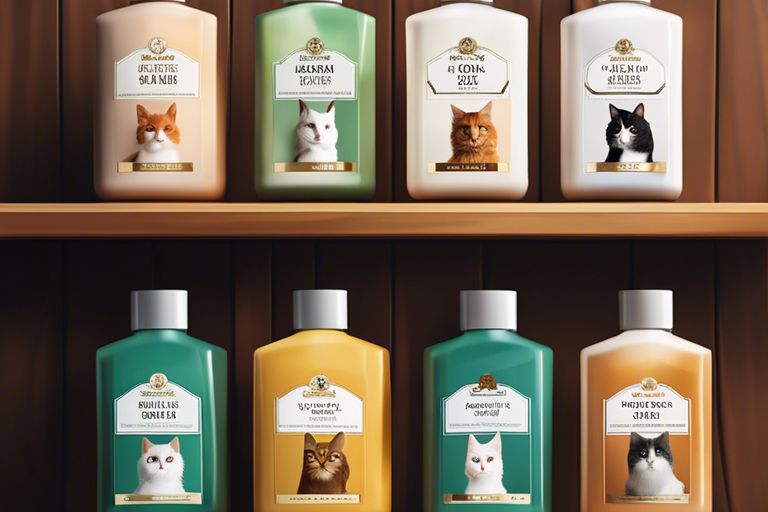Shampoo plays a crucial role in maintaining your cat’s skin and coat health. With a market flooded with numerous options, it can be overwhelming to pick the right shampoo for your feline friend. Different cats have different skin types, and using the wrong shampoo can lead to skin issues or coat problems. Understanding your cat’s skin type and choosing the appropriate shampoo is crucial for their overall well-being.


An Overview of Cat Skin Types
One of the first steps in choosing the right shampoo for your cat is understanding their skin type. Cats can have different skin types just like humans do, and using the appropriate shampoo can help keep their skin healthy and free from issues. There are typically five main types of cat skin: normal, oily, dry, sensitive, and combination.
| Normal Skin | Healthy and well-balanced with no visible issues or irritations. |
| Oily Skin | Excessively shiny or greasy coat, prone to acne or other skin conditions. |
| Dry Skin | Flaky, itchy skin that may be rough to the touch and prone to dandruff. |
| Sensitive Skin | Easily irritated by certain ingredients or environmental factors, may be red or itchy. |
| Combination Skin | A mix of oily and dry patches, requiring a balanced approach to skincare. |
Identifying Your Cat’s Skin Type
Your cat’s skin type can often be determined by observing their coat and any visible symptoms they may be experiencing. For instance, if your cat has flaky skin and excessive itching, they may have dry skin. On the other hand, if their coat appears greasy and they are prone to acne, they likely have oily skin. It’s important to pay attention to these signs to select the right shampoo for their specific needs.
Additionally, consulting with your veterinarian can help pinpoint your cat’s skin type and any underlying issues that may need to be addressed. They can provide valuable insights and recommend the best course of action to maintain your cat’s skin health.
Common Skin Issues in Cats
Overview: Cats can experience a variety of skin issues that range from mild irritations to more serious conditions. Common skin problems in cats include allergies, fungal or bacterial infections, parasites like fleas or mites, and dermatitis. These issues can cause discomfort and may require specific shampoos or treatments to alleviate symptoms and prevent further complications.
The Chemistry Behind Cat Shampoos
Ingredients to Look for in Cat Shampoos
For a cat shampoo to be effective and gentle on your feline friend’s skin, it’s crucial to look for certain key ingredients. Opt for shampoos that contain natural ingredients like aloe vera, oatmeal, coconut oil, and vitamin E. These components are known for their moisturizing and soothing properties, perfect for maintaining your cat’s skin health.
Ingredients to Avoid
Avoid cat shampoos that contain harsh chemicals such as sulfates, parabens, and artificial fragrances. These ingredients can strip away the natural oils on your cat’s skin, leading to dryness, irritation, and potential allergic reactions. Always opt for gentle, hypoallergenic formulas specifically designed for feline skin.
Look for cat shampoos labeled as “pH balanced for cats.” Cats have a different skin pH than humans, so using a shampoo formulated specifically for them will help maintain the proper balance and prevent any skin issues. When in doubt, consult your veterinarian for recommendations on the best shampoo options for your cat’s unique skin needs.
Shampoo Selection for Different Skin Types
To ensure the health and well-being of your feline friend, it is crucial to select the right shampoo based on their skin type. Different cats have different skin needs, and using the wrong shampoo can lead to skin irritations or other issues. Understanding your cat’s skin type will help you choose the best shampoo for their specific needs.
- Shampoos for Sensitive Skin: Cats with sensitive skin require gentle shampoos that are hypoallergenic and free of harsh chemicals or fragrances. Look for shampoos with natural ingredients such as oatmeal or aloe vera, which can help soothe and moisturize sensitive skin.
- Shampoos for Oily Skin: Cats with oily skin may benefit from shampoos that contain ingredients like citrus extracts or tea tree oil, which have astringent properties to help control excess oil production.
- Shampoos for Dry Skin: Cats with dry skin need moisturizing shampoos that contain ingredients like coconut oil or shea butter to help nourish and hydrate the skin.
- Shampoos for Normal Skin: Cats with normal skin can benefit from gentle shampoos that maintain the natural balance of their skin without causing dryness or irritation.
Shampoos for Sensitive Skin
Types of shampoo suitable for cats with sensitive skin are those with hypoallergenic properties and free of harsh chemicals. These shampoos are gentle on the skin and help prevent any irritation or allergic reactions. Look for ingredients like oatmeal and aloe vera, which can help soothe and moisturize the skin without causing any further sensitivity issues.
Shampoos for Oily Skin
Sensitive skin can cause discomfort and irritation for your cat. Therefore, it is vital to choose the right shampoo that is specifically formulated to address their needs. Cat shampoos that are specifically designed for sensitive skin will be gentle and soothing, helping to alleviate any discomfort your cat may be experiencing.
Skin that excessively produces oil can lead to a greasy coat and possible skin issues if not properly managed. Shampoos with ingredients such as citrus extracts or tea tree oil can help regulate the production of oil and keep your cat’s skin fresh and healthy.
Shampoos for Dry Skin
Selection of shampoo for cats with dry skin should focus on products that provide moisture and hydration. Look for shampoos that contain natural oils like coconut oil or shea butter to replenish the skin’s moisture barrier and prevent dryness. These ingredients will help nourish the skin and improve its overall health.
It is important to avoid shampoos that can further dry out the skin or strip it of its natural oils. Choose gentle, moisturizing shampoos that are specifically formulated for dry skin to keep your cat’s skin healthy and hydrated.
Shampoos for Normal Skin
With proper care, cats with normal skin can maintain healthy and balanced skin. Choosing a gentle shampoo that is suitable for regular use will help keep their skin clean without causing any dryness or irritation. Look for pH-balanced shampoos that are gentle on the skin while effectively cleansing the coat.
Skin that is in good condition can benefit from a regular grooming routine using a mild cat shampoo. This will help keep their skin clean, their coat shiny, and their overall health optimal.
Special Considerations
Kitten-Specific Shampoos
Considerations for choosing a shampoo for kittens are important, as their skin is more delicate compared to adult cats. Opt for shampoos specifically formulated for kittens to ensure that the ingredients are gentle and do not irritate their sensitive skin. These shampoos are usually mild and free of harsh chemicals, making them safe for your little feline friend.
Shampoos for Cats with Allergies or Skin Conditions
Conditions like allergies or skin issues require special attention when selecting a shampoo for your cat. Look for shampoos that are hypoallergenic and free of artificial fragrances or dyes. These shampoos can help alleviate itching and soothe irritated skin, providing relief for cats with sensitive skin conditions.
Avoid shampoos that contain common allergens such as parabens, sulfates, or artificial preservatives, as these can exacerbate skin issues in cats with allergies. Consulting with your veterinarian to identify the specific allergy or skin condition can also help determine the most suitable shampoo for your feline companion.
The Role of Medicated Shampoos
One important consideration when it comes to choosing the right shampoo for your cat is the role of medicated shampoos. These shampoos are formulated with active ingredients such as ketoconazole or chlorhexidine, which can help treat various skin conditions like fungal or bacterial infections. Medicated shampoos should only be used under the guidance of a veterinarian to ensure proper dosage and application.
Understanding when to use medicated shampoos is crucial, as improper use can lead to skin irritation or other side effects in your cat. Always follow your veterinarian’s recommendations and instructions when incorporating medicated shampoos into your cat’s grooming routine.

Application Techniques and Bathing Tips
Preparing Your Cat for a Bath
Unlike dogs, most cats are not fans of water and bathing. Therefore, it is necessary to prepare your feline friend for a bath to ensure a smooth and stress-free experience. Start by trimming your cat’s nails to prevent scratches during the bathing process. Brushing your cat beforehand will help remove any tangles or mats in their fur, making it easier to lather and rinse their coat.
- Trim your cat’s nails
- Brush their fur to remove tangles
Any sudden movements or loud noises can startle your cat, so it’s crucial to keep the bathing area calm and quiet to help your furry companion relax.
Proper Application of Shampoo
One of the most critical aspects of bathing your cat is using the right amount of shampoo and applying it properly. Use a cat-specific shampoo and dilute it with water according to the instructions on the bottle. Start by wetting your cat’s fur thoroughly, then gently massage the shampoo into their coat, working up a lather. Be sure to avoid getting shampoo in their eyes, ears, or mouth.
Plus, rinsing is key to preventing skin irritation. Make sure to rinse your cat’s fur thoroughly with lukewarm water, ensuring all the shampoo is removed. Residual shampoo left on the skin can lead to dryness and itching.
Bathing Frequency and Best Practices
Proper bathing frequency will depend on your cat’s skin type and activity level. In general, most cats do not require frequent baths as they are meticulous groomers themselves. Over-bathing can strip their skin of natural oils, leading to dryness and potential skin issues. Consult with your veterinarian to determine the ideal bathing schedule for your feline friend.
Another important tip is to always use lukewarm water for your cat’s bath, as water that is too hot or too cold can be uncomfortable for them. Additionally, have all the necessary supplies ready before starting the bath to minimize stress on your cat.
Maintaining Healthy Feline Skin
Diet and Nutrition for Healthy Skin
One of the key factors in maintaining healthy feline skin is ensuring your cat receives proper nutrition. A diet rich in important fatty acids, such as omega-3 and omega-6, can help promote healthy skin and a shiny coat. Look for cat food that contains high-quality proteins and vitamins that support skin health.
Routine Grooming and Care
The key to healthy skin for your cat is routine grooming and care. The regular grooming not only helps keep your cat’s coat shiny and free of tangles, but it also allows you to check for any signs of skin issues such as dryness, redness, or irritation. Brushing your cat’s fur helps distribute natural oils that keep their skin moisturized and healthy.
To ensure your cat’s skin stays healthy, use a gentle cat shampoo specifically formulated for feline skin during baths. Avoid using harsh human shampoos as they can strip their skin of its natural oils, leading to dryness and irritation. Additionally, make sure to rinse your cat thoroughly to remove all traces of shampoo, as residue left behind can cause skin irritation.
Conclusion
Now that you are equipped with information on the different types of cat shampoos available for various skin types, you can make a more informed decision when selecting the right shampoo for your feline friend. Remember to always consider your cat’s specific needs, whether they have sensitive skin, dry skin, oily skin, or any other skin condition.
By choosing the right shampoo tailored to your cat’s skin type, you can help maintain their skin health and overall well-being. Regular baths with the appropriate shampoo can keep your cat’s skin hydrated, clean, and free from any irritants or allergens, promoting a happy and healthy furry companion.
FAQ
Q: Why is choosing the right shampoo important for my cat’s skin?
A: Choosing the right shampoo for your cat’s skin is crucial to maintain their skin health and prevent issues such as dryness, itchiness, and irritation.
Q: What are the different skin types in cats and how does it affect the choice of shampoo?
A: Cats can have oily, dry, sensitive, or normal skin. The choice of shampoo should be based on your cat’s specific skin type to address any underlying issues effectively.
Q: How do I determine my cat’s skin type?
A: You can determine your cat’s skin type by observing their skin and coat. Oily skin may appear greasy, dry skin may have dandruff or flakiness, and sensitive skin may be red or irritated.
Q: What ingredients should I look for in a shampoo for my cat with sensitive skin?
A: Look for shampoos with natural and hypoallergenic ingredients such as oatmeal, aloe vera, or coconut oil. Avoid shampoos with harsh chemicals or fragrances that can irritate sensitive skin.
Q: How often should I bathe my cat and choose a shampoo based on their skin type?
A: Cats generally do not require frequent baths. Depending on your cat’s skin type, you can choose a shampoo that suits their needs and follow a bathing schedule recommended by your veterinarian or groomer.

















